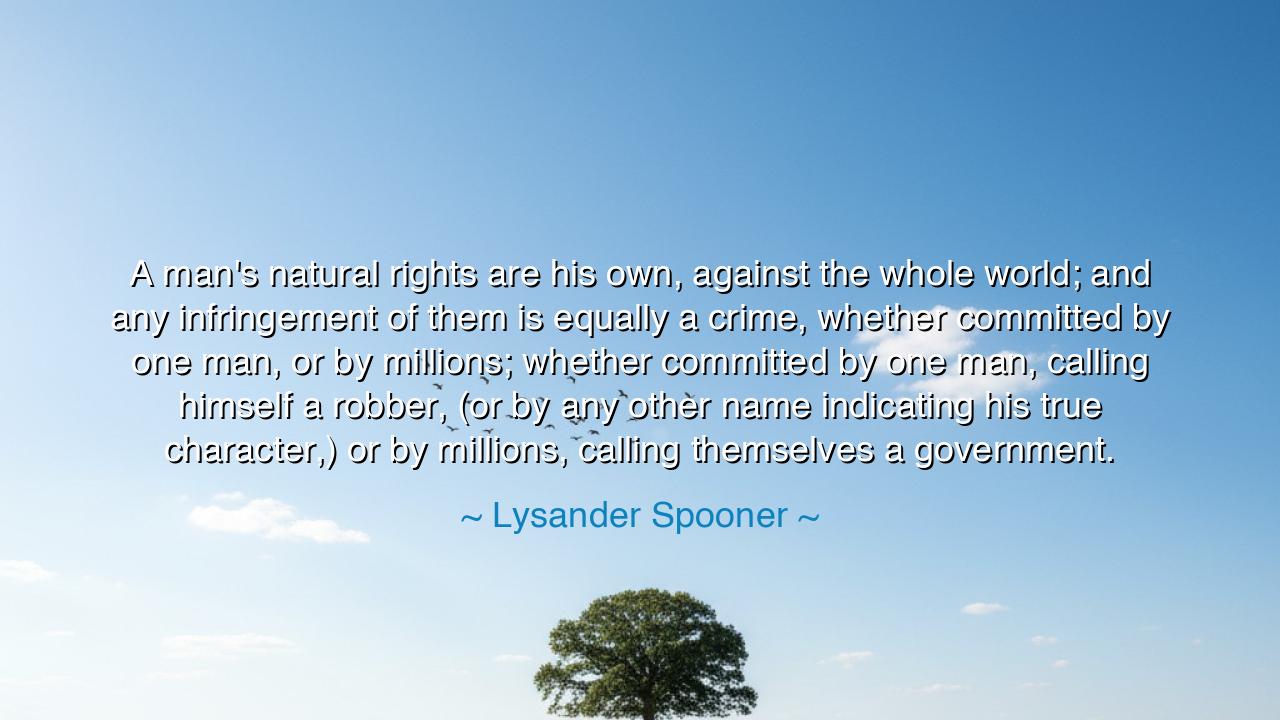
A man's natural rights are his own, against the whole world; and
A man's natural rights are his own, against the whole world; and any infringement of them is equally a crime, whether committed by one man, or by millions; whether committed by one man, calling himself a robber, (or by any other name indicating his true character,) or by millions, calling themselves a government.






Hear, O lovers of liberty and keepers of conscience, the words of Lysander Spooner, who declared: “A man’s natural rights are his own, against the whole world; and any infringement of them is equally a crime, whether committed by one man, or by millions; whether committed by one man, calling himself a robber, (or by any other name indicating his true character,) or by millions, calling themselves a government.” These are not the words of rebellion for its own sake, but of moral revelation—a trumpet call proclaiming that justice does not bend before numbers, and that truth is not transformed by the names men give to their crimes. Spooner, fierce defender of liberty, speaks across the ages to remind humanity that natural rights—those bestowed not by man but by creation itself—are sacred and unalienable, even when threatened by the mightiest powers of the earth.
The origin of this quote comes from Spooner’s writings during the mid-nineteenth century, a time when governments across the world justified slavery, censorship, and taxation under the guise of legality. He was a lawyer, philosopher, and abolitionist, known for his radical belief that law must serve justice, not authority. In his seminal works such as No Treason: The Constitution of No Authority, Spooner questioned the moral legitimacy of government power, arguing that if an act would be wrong for an individual, it does not become right because it is performed by a group calling itself the state. To him, the difference between a thief and a tyrant was only one of scale. The act of taking from another—be it property, freedom, or life—remains a crime, even when cloaked in the robes of law.
In these words, Spooner unveils the eternal struggle between moral law and human law. He reminds us that justice cannot be defined by the will of the majority, for right and wrong do not shift with the tides of opinion. The natural rights of man—to think, to speak, to act, to own, to live free—exist independently of government or society. When any authority, no matter how democratically elected or widely celebrated, infringes upon those rights, it commits the same sin as any individual criminal. The sword of the tyrant is no less wicked than the dagger of the thief, for both violate the divine command that man must be free.
History bears witness to the truth of Spooner’s words. Consider the Nuremberg Trials after the Second World War. The defendants—leaders of a powerful government—claimed that they had merely obeyed their nation’s laws. But the judges answered, in the spirit of Spooner’s philosophy, that law does not justify evil, and that obedience to unjust authority is no defense for moral crime. Thus, the world affirmed that legality is not righteousness, and that the conscience of humanity stands above the decrees of any state.
Spooner’s teaching is also a warning against the seduction of collective power. He shows us how easily people surrender moral responsibility when acting as part of a group. A man who would never steal from his neighbor may vote for policies that do the same under the name of taxation; a man who would never enslave another may support a law that denies liberty. In this way, evil becomes diffuse and unrecognized, and the government becomes the vessel through which men perform injustice without guilt. Spooner calls upon us to awaken—to see through the illusion that authority sanctifies action.
Yet his message is not one of anarchy without virtue; it is a call to personal accountability. He does not say that society must perish, but that every individual within it must be guided first by conscience, not command. Governments may be necessary to protect rights, but when they become their violators, they lose legitimacy. The citizen’s duty, therefore, is not blind obedience, but moral vigilance—to stand against wrongdoing, whether committed by a despot or by a democratic assembly.
The lesson of Spooner’s words is both eternal and urgent: freedom demands moral courage. It is not enough to denounce the crimes of the individual thief while excusing the greater thefts of institutions. One must judge actions by their nature, not by their uniform. Defend your rights as fiercely as your life, for they are bound together. Speak against injustice wherever it is found, for silence lends strength to tyranny. And remember always that the highest loyalty is not to flag or law, but to truth, justice, and the inherent dignity of the human soul.
Thus, the wisdom of Lysander Spooner endures like fire in the night, illuminating the path of all who cherish liberty. His words remind us that governments are not gods but servants—and that whenever they betray the sacred trust of freedom, it is the duty of the people to resist, to correct, and to reclaim what is rightfully theirs: the sovereignty of the self and the sanctity of natural law.






AAdministratorAdministrator
Welcome, honored guests. Please leave a comment, we will respond soon